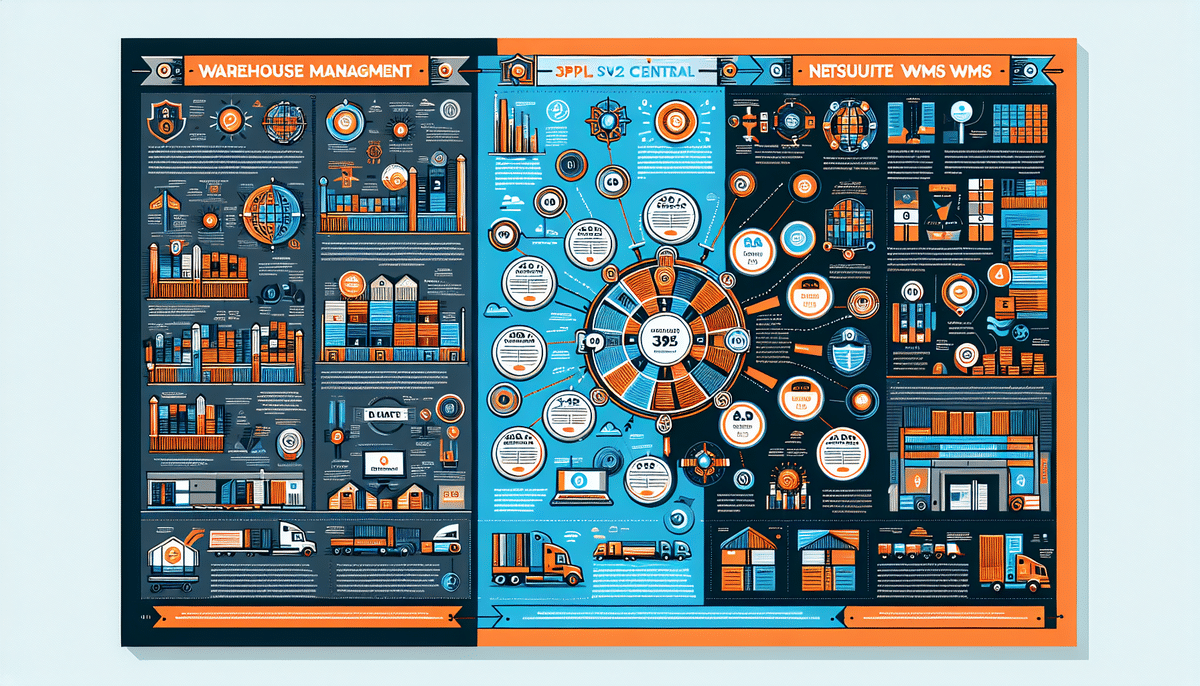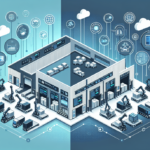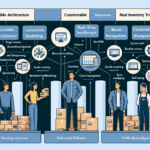Comparing 3PL Central vs NetSuite WMS: An In-Depth Analysis
Effective warehouse management is crucial for businesses of all sizes to maintain inventory accuracy, streamline operations, and ensure timely shipments. Two leading Warehouse Management Systems (WMS) that cater to these needs are 3PL Central (3PL Warehouse Manager) and NetSuite WMS. This comprehensive comparison explores their features, benefits, pricing, and suitability to help you determine which system aligns best with your business requirements.
Overview of 3PL Central (3PL Warehouse Manager)
3PL Central is a cloud-based Warehouse Management System designed specifically for third-party logistics providers (3PLs) and small to medium-sized businesses. It offers a suite of tools to manage inventory, order fulfillment, and shipping efficiently.
Key Features of 3PL Central
- Real-Time Inventory Tracking: Provides up-to-date information on stock levels, reducing the risk of overstocking or stockouts.
- Order Processing: Streamlines order entry, picking, packing, and shipping processes.
- Automated Billing: Simplifies invoicing with automated rate calculations and billing cycles.
- Integrations: Seamlessly connects with e-commerce platforms like Shopify, marketplaces such as Amazon, and accounting software like QuickBooks.
- Customizable Dashboards: Allows users to tailor dashboards to display relevant metrics and KPIs.
Benefits of 3PL Central
- Ease of Use: Intuitive interface that reduces the learning curve for new users.
- Scalability: Supports business growth by accommodating additional warehouses and increased transaction volumes.
- Cost-Effective: Flexible pricing models with monthly and annual subscription options.
- Customer Support: Responsive support team that assists with implementation and troubleshooting.
Overview of NetSuite WMS
NetSuite WMS is an integrated module within the broader NetSuite ERP platform, tailored for medium to large-sized businesses requiring comprehensive warehouse management and seamless integration with other business functions.
Key Features of NetSuite WMS
- Advanced Order Management: Automates order processing and optimizes pick paths to enhance efficiency.
- Real-Time Inventory Tracking: Offers precise inventory visibility across multiple locations.
- Automated Billing and Invoicing: Streamlines financial processes with built-in billing capabilities.
- Comprehensive Reporting and Analytics: Provides detailed insights into warehouse performance and operational metrics.
- Integration with NetSuite Modules: Connects seamlessly with financials, CRM, and e-commerce modules.
Benefits of NetSuite WMS
- Comprehensive Integration: Unified platform that integrates warehouse management with other critical business functions.
- Customization and Scalability: Highly customizable to meet unique business needs and scalable to support growth.
- Enhanced Visibility: Real-time data accessibility from anywhere, facilitating remote management.
- Robust Reporting: Advanced analytics tools that support data-driven decision-making.
Key Differences Between 3PL Central and NetSuite WMS
Target Audience
While 3PL Central is tailored for 3PL providers and smaller businesses aiming for straightforward warehouse operations, NetSuite WMS is designed for medium to large enterprises with complex warehouse management and integrated business processes.
Deployment Options
3PL Central is exclusively cloud-based, offering flexibility and ease of access. In contrast, NetSuite WMS is also cloud-based but benefits from being part of the extensive NetSuite ERP suite, allowing for both cloud and on-premise integrations.
Customization and Integration
3PL Central provides an open API for integrations with various third-party applications, making it adaptable to specific needs. NetSuite WMS offers deeper integration within the NetSuite ecosystem, supporting comprehensive business management beyond warehouse operations.
Pricing Structure
3PL Central offers flexible pricing with monthly and annual subscriptions starting at competitive rates. NetSuite WMS, being part of the NetSuite ERP, has a higher entry price point and additional costs for customization and support, which may be more suitable for larger businesses with the budget for comprehensive solutions.
User Experience
3PL Central is known for its user-friendly and intuitive interface, which facilitates quick adoption. NetSuite WMS, while feature-rich, may present a steeper learning curve due to its extensive functionality and customization options.
Pricing Comparison
Understanding the cost implications of each WMS is vital for making an informed decision:
- 3PL Central: Starting at approximately $435 per month, with additional fees for setup and implementation.
- NetSuite WMS: Requires a subscription to the NetSuite platform, starting at around $999 per month for the base ERP module, plus additional costs for customization and support.
While 3PL Central offers a more affordable entry point, NetSuite WMS provides a broader range of features and integrations that may justify the higher cost for larger organizations.
Customer Reviews and Feedback
Feedback from users highlights the strengths and areas for improvement for both systems:
- 3PL Central: Users appreciate its ease of use, flexibility, and robust integration capabilities. The responsive customer support team is frequently commended for their assistance.
- NetSuite WMS: Customers value the comprehensive feature set and seamless integration with other NetSuite modules. However, some users find the initial setup complex and the pricing structure challenging for smaller budgets.
Choosing the Right WMS for Your Business
Selecting the appropriate Warehouse Management System depends on various factors, including business size, complexity of operations, budget, and integration needs. Consider the following when making your decision:
- Business Size: Smaller businesses and 3PL providers may find 3PL Central more aligned with their needs, while larger enterprises may benefit from the extensive capabilities of NetSuite WMS.
- Integration Needs: If seamless integration with other business systems is a priority, especially within the NetSuite ecosystem, NetSuite WMS is advantageous.
- Budget: Evaluate the total cost of ownership, including subscription fees, implementation costs, and ongoing support.
- Scalability: Consider how each system can grow with your business and accommodate increasing operational demands.
Integration Capabilities
Both 3PL Central and NetSuite WMS offer robust integration options, but they cater to different integration needs:
- 3PL Central: Utilizes an open API for integrations with a variety of third-party applications, including e-commerce platforms, accounting software, and shipping carriers.
- NetSuite WMS: Leverages the comprehensive NetSuite suite, enabling seamless integration with financials, CRM, e-commerce, and other enterprise applications within the NetSuite ecosystem.
Future-Proofing Your Warehouse Management
When selecting a WMS, it's essential to choose a solution that can adapt to future business needs:
- 3PL Central: Offers scalability to support business growth, additional warehouses, and increased transaction volumes without significant overhauls.
- NetSuite WMS: Provides extensive customization and integration capabilities, allowing businesses to evolve their warehouse operations alongside broader business transformations.
Investing in a scalable and flexible WMS ensures that your warehouse management can keep pace with market demands and organizational changes.
Case Studies of Successful Implementations
Real-world examples demonstrate how businesses have leveraged these WMS solutions to optimize their operations:
- Brightstar: A global leader in wireless device supply chain solutions, Brightstar utilizes 3PL Central to manage multiple warehouses efficiently and streamline its order fulfillment processes.
- TigerDirect: An online retailer, TigerDirect employs NetSuite WMS to oversee inventory across various warehouses and automate order processing, enhancing overall operational efficiency.
Conclusion: Which Warehouse Management System Is Right for You?
Choosing the right Warehouse Management System hinges on your business's specific needs and objectives. 3PL Central is an excellent choice for small to medium-sized businesses and 3PL providers seeking a user-friendly, cost-effective solution with strong integration capabilities. On the other hand, NetSuite WMS is ideal for medium to large enterprises that require a comprehensive, customizable system integrated within a broader ERP framework.
Before making a decision, it's advisable to conduct a thorough evaluation of both systems, consider your current and future business requirements, and possibly engage with vendors for demonstrations and consultations to ensure the chosen WMS aligns perfectly with your operational goals.






















